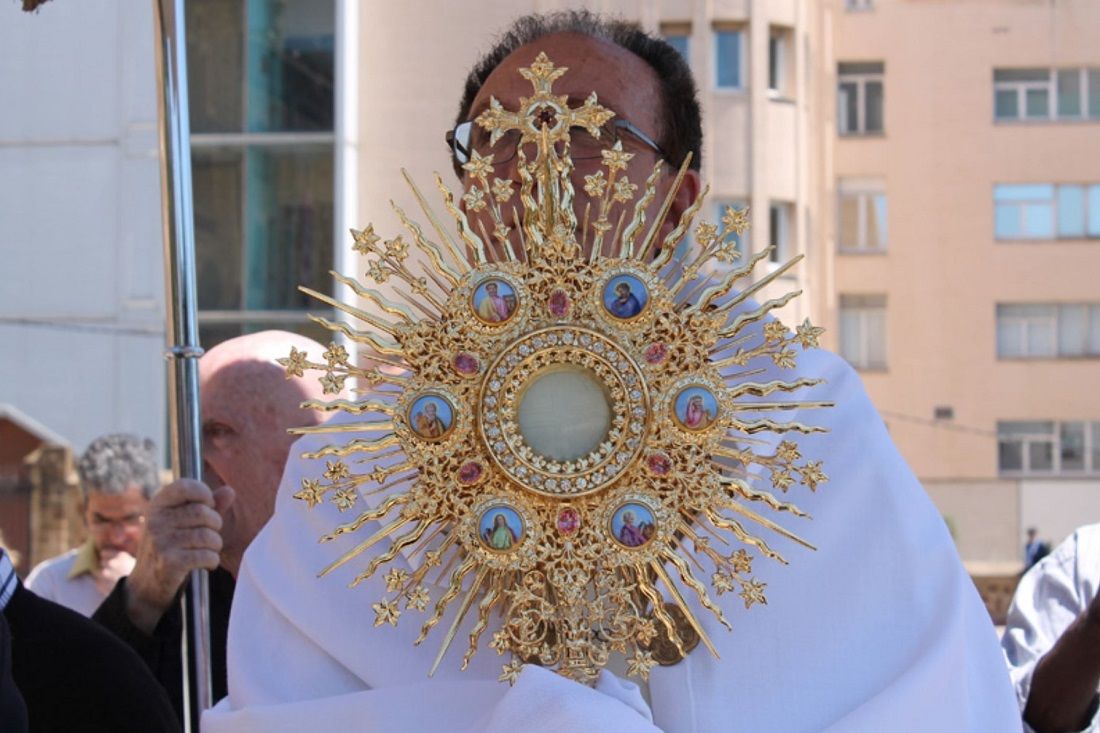The Eucharist invokes God's memory. Christ entered into time, therefore all of time has become salvation history.[1] God's memory is the window through which the whole Body of Christ gazes upon all of salvation history: past, present, and future. The Church is the continuation of Christ through history, speaking the Word time and again in the Eucharist.[2] As many grains are joined together in bread,[3] the Eucharist gathers us into Christ's Body.[4]
The Eucharist celebrates Jesus Christ as he existed, before time, in time, and outside of time. The Eucharist is never a divine escape from this world, but rather the Eucharist reforms creation[5] in the image and likeness of God as it was originally made: in and for love.[6] In the Eucharist, God's pure and perfect Word bends down to speak our language of symbols and rituals, so that one day we might speak God's Word.[7] The Eucharist humbles itself to be dependent upon the work of human hands.[8] The self-emptying of Christ's body and blood into the sacrament[9] recapitulates the perfect sacrifice of Christ that began with the vulnerability of the incarnation[10]—for to become human is to already be making one's way towards death. The Eucharist perpetuates the gift of love in Christ and confesses His death, resurrection, and ascension.[11] The Eucharist is not only the person of Jesus Christ, but the Eucharist reveals the actions of Jesus that tell us who Jesus is: "God[12] saves."
In the liturgy, the believer's acclamation of Christ's death is not merely nostalgic but participatory,[13] conjoining us to Christ's memory. The Eucharist mercifully reclaims our unworthy hands to serve him.[14] The Eucharist consummates our forgiveness, restores our humanity, and reincorporates us into communion. By sharing in the cup of Christ's blood, which was shed for our redemption, we partake in the one obedient sacrifice so that we no longer live for ourselves[15] but are conformed to Christ's Paschal narrative. The Eucharist calls for a death to self[16] so that we might put on Christ[17] by entering into a covenantal relationship with God from which new life springs forth in us.[18] [19] The wellspring of this sacramental encounter impregnates us with Christ. The Eucharist practices this relationship in our dialogue with God as His beloved children and as the Church.[20] The Eucharist extends our relationship with God beyond the threshold of death. Because of Christ's Paschal sacrifice, there is no depth of suffering or abandonment[21] where Christ has not gone before us and does not journey with us.[22] Suffering transfigured into gift is the very crucible wherein unity is formed.[23] The Eucharistic sacrifice unites us in the Holy Spirit as we repel our inclinations of autonomy and surrender our self-interest for the good of the Body.[24]
The Eucharist reveals our ecclesial vocation as the pilgrim Church, joining our voices[25] in one sacrifice of praise with Mary, the Apostles, all the angels and Saints.[26] Though the definitive Word has spoken, our salvation, redemption, and sanctification are not yet finally realized.[27] The Eucharist draws us into and yet anticipates the kingdom to come.[28] The Eucharist remediates our thwarted perception of Christ's unapproachable light[29] through the repeated enactment of Christ's Paschal mystery.[30] The Eucharist sends us forth from the table of fellowship to work towards the bond of charity that is the very reality of the Eucharist.[31] Just as Christ took, blessed, broke, and gave his body to the world, so too does Christ gather us as disciples, grace us with his friendship, break us from self-interest, and give us over to the poor, the prisoners, and the sorrowful[32] as agents and revealers of God's love.[33]
The Eucharist recapitulates the fullness of God's action in history.[34] The Eucharist remembers Christ's loving sacrifice and re-members us as the Mystical Body of Christ,[35] healing and glorifying all of creation. The Eucharist both reveals and transfigures us into the gift of love that Christ is. The Eucharist loves us into being.[36] It loves us to the end.[37]
Featured Image: MJGDoblado, Procesión de la Custodia en día de Corpus Christi en el Santuario de San José de la Montaña, 2 June 2013; Source: Wikimedia Commons, CC BY 3.0.
[1] Henri de Lubac, Catholicism: Christ and the Common Destiny of Man (San Francisco, CA, Ignatius Press. 1950), 141. "It will be the history of the penetration of humanity by Christ."
[2] In the institution narrative, the priest speaks Christ's words in persona Christi.
[3] Henri de Lubac, op. cit., 99. "I am your food, but instead of my being changed into you, it is you who shall be transformed into me."
[4] Augustine of Hippo, Exposition on the Book of Psalms. Vol 2, (Grand Rapids, MI: Christian Classics Ethereal Library. 1886), Exposition 2 of Psalm 30, "The Head was transfiguring the members into Himself."
[5] Kevin Irwin, Models of the Eucharist (Mahwah, NJ: Paulist Press. 2005), 209. "O God, you wonderfully created human nature, and even wonderfully restored its dignity. Give us the grace to share in the divinity of Christ who humbled himself to share in our humanity." This is the opening prayer of Christmas liturgy.
[6] Joseph Ratzinger, "Sin and Salvation," in In the Beginning . . . A Catholic Understanding of the Story of Creation and the Fall (Grand Rapids, MI: Wm Eerdemans Publishing Co. 1995), 72. Ratzinger defines human nature as relational and only existing by participation in God's love.
[7] This self-emptying movement of the Word to humanity is recapitulated throughout Scripture. In Exodus 20:2-11, God gives the Israelites finite actions (commandments) as guidance for living in his love. In Deuteronomy 6:4-9, the Shema reveals that our human bodies are intended to confess God through our very creatureliness.
[8] Genesis 1:28. These are the hands that "subdue the earth," hands that harvest wheat and grapes and form them into bread and wine.
[9] Kevin Irwin, op. cit., 46. "It is through the materiality—the human, the fragile, and the hinges of this earth—that we experience the divine."
[10] Philippians 2:6-8. "Who, though he was in the form of God, did not regard equality with God something to be grasped. Rather, he emptied himself, taking the form of a slave, coming in human likeness; and found human in appearance, he humbled himself, becoming obedient to death, even death on a cross."
[11] Catholic Church, The Rites of the Catholic Church as revised by the Second Vatican Ecumenical Council. Vol 1, (Collegeville, MN: Liturgical Press. 1990). "In memory of his death and resurrection." Eucharistic Prayer II recalls Christ's loving action. "Calling to mind the death your Son endured for our salvation; his glorious resurrection and ascension into heaven, and ready to greet him when he comes again." Eucharistic Prayer III commemorates the communal event and anticipates the kingdom.
[12] Exodus 3:14. "I Am Who Am."
[13] Catholic Church, "Eucharistic Prayer IV," The Rites of the Catholic Church as revised by the Second Vatican Ecumenical Council. "When we eat this Bread and drink this Cup, we proclaim your death, Lord Jesus, until you come again." Eucharistic Prayer IV reveals active proclamation through communing.
[14] Kevin Irwin, op. cit., 178. This overturns the place of betrayal: both the altar of a sacrifice (where Christ was betrayed unto death) and our bloodstained hands.
[15] Catholic Church, “Eucharistic Prayer IV,” op. cit.
[16] Genesis 22. This is the sacrificial offering, the aqedah, in which we lay all that we have and are on the altar. For Abraham, everything that he was and had been given was embodied in Isaac, his most precious beloved son, whom he obediently offered to God.
[17] Romans 13:14.
[18] For Abraham, his hospitable reception of God's Trinitarian relationship brought forth a son as the manifestation of the covenant. Abraham's sacrificial offering of Isaac renewed the relationship between God and Abraham and brought forth more descendants. Likewise, when Mary obediently uttered the fiat of self-offering to God, she became pregnant with the life and light of the world.
[19] John 12:24. "Amen Amen I say to you, unless a grain of wheat falls to the ground and dies, it remains just a grain of wheat; but if it dies it produces much fruit." The ultimate sacrifice of death leads to new and abundant life in Christ.
[20] Catholic Church, "Eucharistic Prayer II," op. cit., V: "The Lord be with you." R: "And with your spirit."
[21] Kevin Irwin, op. cit., 213. Christ unites Himself to the experience of even simply feeling abandoned by the real presence of Christ in the Eucharist.
[22] Matthew 27:46. "Abba, abba, why have you forsaken me?" Christ endures absolute separation from the Father by descending into the dead, crying out in abandonment, united to Israel's memory (Psalm 22) and all suffering yet to come.
[23] Henri de Lubac, op. cit., 95.
[24] Kevin Irwin, op. cit., 92. "All liturgy offers us nothing less than communal conversion and communal self-transcendence."
[25] The Eucharistic prayers use "our Lord", in exaltation of Christ's authority over us, and "our Lord" in communal assertion of Christ as Head of us, His Body.
[26] This is both the local and historical Church (as evident in Eucharistic Prayer I, which names the figures of the early Church of Rome) and the mystical Church, which extends beyond our tangible knowledge.
[27] Kevin Irwin, op. cit., 196.
[28] Ibid., 201. "Our 'future' in God is already 'present' in the Eucharist."
[29] Catholic Church, "Eucharistic Prayer IV,” op. cit. "For you are the One God living and true, existing before all ages and abiding for all eternity, dwelling in unapproachable light."
[30] Kevin Irwin, op. cit., 41. "The Eucharist returns participants back to life with their vision of Christianity sharpened and the challenge of living that vision the more clear."
[31] This is the res tantum – the effects of Christ's sacrifice: the charity and Mystical Body of Christ.
[32] Catholic Church, "Eucharistic Prayer IV," op. cit. "To the poor he proclaimed the good news of salvation, to prisoners, freedom, and to the sorrowful of heart, joy."
[33] At Pentecost, the apostles who had been given the bread of life, were blessed with the Holy Spirit (broken from one another in various tongues and broken by death in martyrdom) and given up for the kingdom of God on Earth (Acts 2:1-13). At Emmaus, Christ walks with disciples who recognize Christ in the breaking of the bread and go forth (Luke 24:13-32).
[34] Henri de Lubac, op. cit., 168.
[35] Ibid.,101. "Jesus Christ bears us in himself; we are, if I may dare to say so, more truly His body than His own body."
[36] Joseph Ratzinger, op. cit., 72. "I alone am not myself, but only in and with you am I myself." Humans are made into beings and revealed as subjects by relationship with God.
[37] Catholic Church, "Eucharistic Prayer IV," op. cit. "Having loved his own who were in the world, he loved them to the end." This statement reiterates that Christ entered into very particular (historical and local) relationships. Christ's abiding love in the Eucharist extends this same particular and intimate love.

